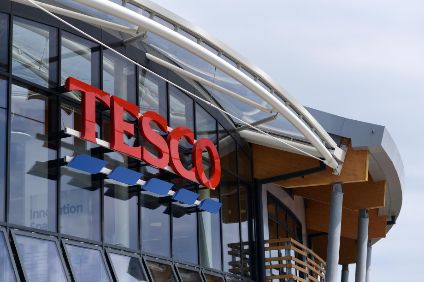
UK supermarket Tesco has reported a drop in annual pre-tax profit and revenue amid a warning that Covid-19 could impact its retail cost lines by up to GBP925m (US$1.1bn).
In a statement today (8 April), Tesco said while the full financial impact of the crisis for 2020/21 is impossible to predict with a high degree of certainty, the estimated impact on its retail cost lines is between about GBP650m and GBP925m, including significant cost increases in payroll, distribution and store expenses.
It added, while it would not be prudent to provide financial guidance for 2020/21, if customer behaviour were to return to normal by August it is likely the additional cost headwinds incurred in its retail operations would be largely offset by the benefits of food volume increases, twelve months’ business rates relief in the UK, and prudent operations management.
“The specific challenges across the group are three-fold, and most keenly felt in the UK,” Tesco said. “First, the significant change in buying behaviour of our customers. Second, the impact of the virus on our colleagues and thirdly, helping the more vulnerable in society, as defined by the UK Government.”
In the first few weeks of the crisis, the company noted “significant panic buying” led to an uplift of about 30% in the UK, clearing the supply chain of certain items. It added this has now stabilised across the group and more normal sales volumes are being experienced.
Publishing its preliminary results for the financial year ending 29 February, Tesco said profit before tax declined 18.7% to GBP1.32bn, compared with earnings of GBP1.62bn year earlier. Group operating profit before exceptional items, meanwhile, which gives a picture of the company’s underlying performance, was GBP2.96bn, up 12.6% at constant exchange rates and up 13.5% at actual rates.

US Tariffs are shifting - will you react or anticipate?
Don’t let policy changes catch you off guard. Stay proactive with real-time data and expert analysis.
By GlobalDataGroup sales were down 0.7% to GBP56.5bn from GBP56.9bn in the prior year. In the UK and the Republic of Ireland (ROI), total sales increased by 0.1% at actual exchange rates, against a backdrop of subdued market growth. Like-for-like sales in the region edged up 0.2%.
The retailer adds it continues to improve overall product mix, making its general merchandise offer more relevant by focusing on categories that are complementary to its food offer, such as home and cook. In the coming year, Tesco plans to rebalance space further, in particular by augmenting its F&F clothing range in a number of its large stores.
“Over the last five years, we have focused on serving customers better, re-engaging our colleagues, completely resetting our relationships with our suppliers and as a result we have been able to add value for our shareholders. These endeavours put us in a strong operational and financial position to deal with the challenges of Covid-19,” says CEO Dave Lewis.
Meanwhile, in relation to the proposed sale of its businesses in Thailand and Malaysia, Tesco said completion of the sale is expected in the second half of 2020, conditional on shareholder and regulatory approval.
What the analysts say
Thomas Brereton, retail analyst at GlobalData, a leading data and analytics company, notes the unwanted arrival of Covid-19 on UK shores has had – along with all retailers – an “unprecedented” impact on Tesco, as the UK’s largest food retailer rushes to adapt to the uplift in demand and seismic changes in consumer behaviour.
“Although today’s results provide limited quantitative data on current trading, Tesco has suggested a 30% uplift demand over the “first few weeks” of the crisis as shoppers panic bought, in line with our view of an updated UK grocery market growth forecast of 7.1% for 2020. At this point, Tesco should be praised for its quick introduction of reactive measures: improving instore safety; financial support for employees where needed; special resources for NHS and other key workers and the hiring of 45,000 new colleagues since 20 March.”
Brereton adds before the arrival of Covid-19, Tesco seemed poised for a progressive and exciting 2020.
“Its restored focus on in its core food retail arm – in a bid to deter growing market share from disruptors Aldi and Lidl – resulted in a jolly Christmas trading period where like-for-like sales grew ahead of competitors, as numerous new price investment initiatives resonated with shoppers. But since mid-March, tactics to retain customer share became academic as demand soared, and instead, Tesco is now focused on keeping its current operations running as smoothly as possible through boosting store capabilities and expanding the number of home delivery slots (up 20% versus pre-Covid).”
Brereton says GlobalData broadly expects that Tesco will make greater revenue gains than most of its rivals over the period, leaning on its national brand awareness to drive shoppers to its larger locations.
“Given the speed of development of this crisis, it remains too early to accurately describe the full scale of the implications, but incoming CEO Ken Murphy (who is due to arrive in the autumn) will certainly take the helm at a very different Tesco than he, or anyone else, was anticipating even a month ago.”



